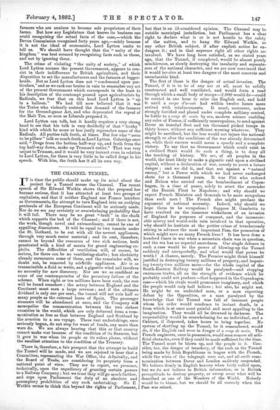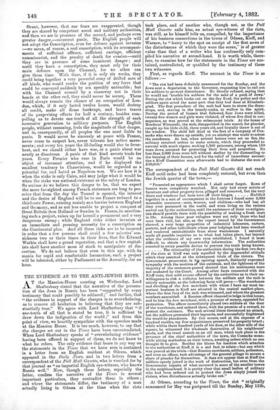THE CHANNEL TUNNEL.
IT is time the public should make up its mind about the project for a Tunnel across the Channel. The recent speech of Sir Edward Watkin shows that the proposal has become serious, that it has attracted at least two groups of capitalists, and that if neither England nor France interfere as Governments, the attempt to turn England into an outlying peninsula of the European Continent will be seriously made. Nor do we see any certainty or overwhelming probability that it will fail. There may be no great "fault" in the chalk which supports the bed of the Channel ; and if there is not, the work, though novel and extraordinary, cannot be one of appalling dimensions. It will be equal to two tunnels under the St. Gothard, to be cut with all the newest appliances, through very much easier material ; and its cost, therefore, cannot be beyond the resources of two rich nations, both penetrated with a kind of mania for grand engineering ex- ploits. The difficulties of ventilation will, of course, be serious, for there can be no ventilating-shafts ; but electricity already surmounts some of them, and the remainder will, we doubt not, be removed by sciettific appliances. Air is as transmissible a fluid as water, and a gigantic wind sail involves no necessity for new discovery. Nor are we so confident as some of our contemporaries of the pecuniary failure of the scheme. When eight or ten millions have been sunk, the rest will be found somehow ; the artery between England and the Continent must earn a large revenue ; and if the ultimate dividend is only one per cent., the tunnel will not ruin half so many people as the external loans of Spain. The passenger steamers will be abandoned at once, and the Company will monopolise the communication between the two richest countries in the world, which are only debarred from a com- munication as free as that between England and Scotland by the aversion to a sea voyage. These vast undertakings, once seriously begun, do not stop for want of funds, any more than wars do. We are always hearing that this or that country cannot make war because of the condition of its finances, but it goes to war when its people or its rulers please, without the smallest attention to the condition of the Treasury.
There is, therefore, a fair prospect that the attempt to build the Tunnel will be made, and we are rejoiced to hear that a Committee, representing the War Office, the Admiralty, and the Board of Trade, are considering its propriety from a national point of view. They are to report, we presume, technically, upon the expediency of granting certain powers to a Railway Company ; but we trust they will go much further, and urge upon Parliament the duty of an absolute and peremptory prohibition of any such undertaking. Sir E. Watkin seems to think this beyond the rights of Parliament, but that is an ill-considered opinion. The Channel may be outside municipal jurisdiction, but Parliament has a clear right to declare what is or is not hostile to the safety of the nation, and to hang Sir Edward Watkin, or any other British subject, if after explicit notice he en- dangers it ; and in that supreme right all other rights are involved. We have long been satisfied, as we stated years ago, that the Tunnel, if completed, would be almost purely mischievous, as slowly destroying the insularity and separate- ness of the national character, and we are now convinced that it would involve at least two dangers of the most concrete and unendurable kind.
The first of these is the danger of actual invasion. The Tunnel, if it is to be of any use at all, must be solidly constructed and well ventilated, and would form a road through which a small body of troops-2,000 would do—could be carried in one hour to seize the English end, and hold it until a corps d'armee had within twelve hours more arrived with reinforcements. It must, moreover, unless strongly fortified and placed under complete military control, be liable to a coup de main by sea, modern science enabling any ruler of France, if sufficiently unscrupulous, to send against Dover an ironclad fleet and ten thousand picked troops in thirty hours, without any sufficient warning whatever. They might be sacrificed, but the loss would not injure the national strength or alter the conditions of the war already determined on, while their success would mean a speedy and a complete victory. To say that no Government which could exist in- a civilised State would do such a thing, is to deny all the teaching of history. We are, of all peoples in the world, the least likely to make a gigantic raid upon a civilised capital, without a declaration of war, merely to avert a future danger ; and we did it, and that not against a "natural enemy," but a Power with which we had never exchanged shots for a thousand years. It was Pitt who ordered and Nelson who carried out the bombardment of Copen- hagen, in a time of peace, solely to avert the surrender of the Danish Fleet to Napoleon ; and why should we expect French Ministers and Generals to be more scrupulous than such men? The French also might produce the argument of national necessity. Indeed, why should we hope them to be scrupulous ? Suppose M. Gambetta to have resolved on the immense wickedness of an invasion of England for purposes of conquest, and the inconceiv- able misery and world-wide ruin involved in that operation, why should he hesitate at the pettier crime of treacherously seizing in advance the most important Pass, the possession of which might save so many French lives ? It has been done a hundred times in war when a mountain chain was in question, and the sea has no especial sacredness. Our single defence in such a case would be the power of blowing-up the Tunnel, suddenly and unexpectedly, and what would that power be worth ? A chance, merely. The Premier might think himself justified in destroying twenty millions of property, and impair- ing twenty-two millions more—for the whole capital of the South-Eastern Railway would be paralysed—and stopping enormous trades, all on the strength of evidence which he probably could not produce—that happened in the Copenhagen case—which his rivals would pronounce imaginary, and which the people would only half believe ; but also, he might not. He might be an undecided man, or a man expecting defeat by the Opposition, or a man paralysed by the knowledge that the Tunnel was full of innocent people whom his order would condemn to instant death, in a form which is at once most painful and most appalling to the imagination. They would all be drowned in darkness. The. responsibility would be overwhelming for an individual, and a. Cabinet, if dispersed, takes hours to bring together. No system of shutting up the Tunnel, be it remembered, woald do, if the English end were in danger of a coup de main. The French engineers, once in possession, would soon remove all arti- ficial obstacles, even if they could be made sufficient for the time. The Tunnel must be blown up, and the people in it. Con- sider, too, the danger of treachery, of the rush on the Tunnel being made by Irish Republicans in league with the French, while the wires of the telegraph were cut, and all swift com- munication between Dover and London suddenly suspended.
We believe firmly in English bravery when fairly called upon, but we do not believe in British information, or in British promptitude to destroy property, or sweep away what will be described as one of the Wonders of the World. Nobody would be to blame, but we should be all unready when the Pass was seized. Grant, however, that our fears are exaggerated, though they are shared by competent naval and military authorities, and then we are in presence of the second, and perhaps even greater danger,—recurrent panic. The English people will not adopt the Conscription, even for defence against invasion —we mean, of course, a real conscription, with its accompani- ments of sufficient officers, sufficient carriage, efficient commissariat, and the penalty of death for evasion—until they are in presence of some imminent danger ; and until they have a conscription, they must rely for their main defence upon the Channel, for no other can give them time. With time, if it is only six weeks, they could bring together a very powerful army of drilled men of all kinds, who would render the position of any force that could be conveyed suddenly by sea speedily untenable ; but _ with the Channel crossed by a causeway not in their hands at the other end, they could never be secure. There would always remain the chance of an occupation of Lon- don, which, if it only lasted twelve hours, would destroy all credit, make all firms bankrupt, and leave traces of its pauperising effects for half a century, besides com- pelling us to devote one-tenth of all the strength of each successive generation to military purposes. The English people, without reasoning, feels the magnitude of that danger, and is, consequently, of all peoples the one most liable to panic. It would never be sincerely at peace with France, never cease to suspect her, never tolerate her active move- ments; and every ten years the ill-feeling would rise to fever- heat, and we should either have war, or a panic about war nearly as disastrous. A panic of that kind arrests trade for years. Every Premier who rose in Paris would be an object of incessant attention, and if he displayed the smallest tendency to Chauvinism, would be regarded as a potential foe, and hated as Napoleon was. We see how it is when the stake is only Cairo, and may judge what it would be when the stake was national existence or the safety of London. So serious do we believe this danger to be, that we expect the more far-sighted among French statesmen ere long to per- ceive that from the day the Tunnel is opened, the interest and the desire of England will be to see France reduced to a third-rate Power, existing mainly as a barrier between England and Get many, and as not less unable to project a conquest of Great Britain than Holland or Sweden is. France, in sanction- ing such a project, raises up for herself a permanent and a very dangerous enemy ; while England risks either invasion or an immediate and pressing necessity for a conscription on the Continental plan. And all these risks are to be incurred in order that a few persons shall avoid a few minutes' sea- sickness two or three times in their lives, that Sir Edward Watkin shall have a grand reputation, and that a few capital- ists shall have another mass of stock to manipulate at dis- cretion. We do not believe that even in this age, with its mania for rapid and comfortable locomotion, such a project will be tolerated, either by Parliament or the Assembly, for an hour.



































 Previous page
Previous page